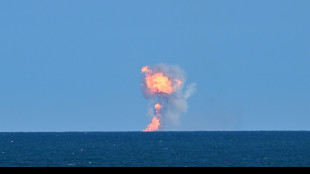
-
 US envoy presses Israel-Hezbollah truce bid in Lebanon visit
US envoy presses Israel-Hezbollah truce bid in Lebanon visit
-
'No controversy' around Alldritt exclusion for Argentina Test

-
 Stock markets gain, dollar higher before Nvidia earnings
Stock markets gain, dollar higher before Nvidia earnings
-
New WHO financing mechanism put to the test

-
 Besigye kidnapping: Uganda president's doctor turned rival
Besigye kidnapping: Uganda president's doctor turned rival
-
Star K-pop producer of NewJeans quits after legal spat with BTS agency

-
 'Eternal' Nadal leaves legacy as he retires from tennis
'Eternal' Nadal leaves legacy as he retires from tennis
-
Vieira takes over at struggling Gerona

-
 Australia's Kerevi banned for Morgan tackle
Australia's Kerevi banned for Morgan tackle
-
Bellamy defies 'lunatic' reputation to inspire Wales revival

-
 Kremlin says US 'doing everything' to prolong 'war' in Ukraine
Kremlin says US 'doing everything' to prolong 'war' in Ukraine
-
Magritte painting nets auction record of $121 million

-
 Markets fluctuate as traders weigh geopolitical tensions
Markets fluctuate as traders weigh geopolitical tensions
-
N. Korea's latest weapon? Bombarding South with noise

-
 'Kidnapped' Uganda opposition figure Besigye to appear at military court: lawyer
'Kidnapped' Uganda opposition figure Besigye to appear at military court: lawyer
-
Asian markets fluctuate as traders weigh geopolitical tensions

-
 'An inauspicious day': the landmines ruining Myanmar lives
'An inauspicious day': the landmines ruining Myanmar lives
-
UN to vote again on Gaza ceasefire, US plans unclear

-
 Japan's manga powerhouse 'Dragon Ball' turns 40
Japan's manga powerhouse 'Dragon Ball' turns 40
-
Japanese, Koreans bottom of global love life survey

-
 Son blames 'mistakes' after South Korea held by Palestine in qualifier
Son blames 'mistakes' after South Korea held by Palestine in qualifier
-
Japan ramps up tech ambitions with $65 bn for AI, chips

-
 Lights, action, melodrama! Silent films get new reel at London haven
Lights, action, melodrama! Silent films get new reel at London haven
-
Myanmar led world in landmine victims in 2023: monitor

-
 ICC to sentence Timbuktu war criminal
ICC to sentence Timbuktu war criminal
-
Ugandan opposition figure Besigye 'kidnapped', says wife

-
 Australia's Jason Day eyes more major glory after resurgence
Australia's Jason Day eyes more major glory after resurgence
-
Machu Picchu security boosted after visitors spread human ashes

-
 Popovic hails Australia character in 'crazy' World Cup qualifier
Popovic hails Australia character in 'crazy' World Cup qualifier
-
Taliban govt clearing 'un-Islamic' books from Afghanistan shelves

-
 Argentina beat Peru as Uruguay hold Brazil
Argentina beat Peru as Uruguay hold Brazil
-
Asian markets struggle as traders weigh geopolitical tensions

-
 Tatum stars as Celtics end Cavaliers unbeaten start
Tatum stars as Celtics end Cavaliers unbeaten start
-
Hurting India under pressure in blockbuster five-Test Australia series

-
 'They killed her dream': Israel strike leaves woman footballer in coma
'They killed her dream': Israel strike leaves woman footballer in coma
-
Iraq holds its first census in nearly 40 years

-
 Iraqis face tough homecoming a decade after IS rampage
Iraqis face tough homecoming a decade after IS rampage
-
Russian net tightens around last civilians left in eastern Ukraine

-
 Olympic champion Tebogo aims to inspire next generation of African athletes
Olympic champion Tebogo aims to inspire next generation of African athletes
-
Valencia on target as ten-man Ecuador upset Colombia

-
 'Rust' to premiere three years after on-set shooting
'Rust' to premiere three years after on-set shooting
-
Strike at French cognac maker Hennessy over measures in China spat

-
 Xi, Lula meet in Brasilia to 'enhance ties'
Xi, Lula meet in Brasilia to 'enhance ties'
-
SpaceX fails to repeat Starship booster catch, as Trump watches on

-
 'I have left a legacy': Nadal retires from tennis
'I have left a legacy': Nadal retires from tennis
-
US recognizes Venezuela opposition's Gonzalez Urrutia as 'president-elect'

-
 European powers, US seek to censure Iran at UN nuclear watchdog board
European powers, US seek to censure Iran at UN nuclear watchdog board
-
UNAIDS chief says husband, Ugandan opposition figure Besigye, 'kidnapped'

-
 Nadal's sensational career ends as Netherlands defeat Spain in Davis Cup
Nadal's sensational career ends as Netherlands defeat Spain in Davis Cup
-
US announces talks with Israel over civilian casualties in Gaza


Russian gas stop promises 'sharp recession' for Germany
An immediate end to Russian energy imports would send Germany into "sharp recession" next year, the country's leading economic institutes said in a forecast published Wednesday.
Persistently higher energy prices and geopolitical risks herald the beginning of a new era for Europe's industrial powerhouse, they warned, one which not every company will survive.
"Not all business models that were profitable in Germany in the past will have a future," Stefan Kooths, vice-president of the IfW Kiel institute, said at a Berlin press conference.
The government must keep this in mind when it considers support measures for struggling firms, he added.
Germany, which is highly dependent on Russian gas for its energy needs, has so far resisted calls for a European boycott in response to the war in Ukraine.
Closing the taps in "mid-April" this year would limit growth to 1.9 percent in 2022 and push Germany into a recession in 2023, causing the economy to shrink by 2.2 percent, according to the forecast.
The impact of a boycott would "not be overcome" over the next two years, the institutes (DIW, Ifo, IfW Kiel, IWH and RWI) said in a joint statement.
Europe's largest economy could yet suffer a "set back" at the end of 2023 into 2024, as demand for energy rises in the European winter, before "gradually" returning to growth.
Before Moscow began its war in Ukraine, a third of Germany's oil imports, 45 percent of its coal purchases and 55 percent of gas imports came via pipelines from Russia.
The country has set about weaning itself off Russia energy imports, accelerating investments in renewables and building LNG (liquefied natural gas) terminals on the North Sea coast to import gas from further afield, though they would take years to come online.
Economy Minister Robert Habeck said at the end of March that it would likely take until mid-2024 for Europe's largest economy to wean itself off Russian deliveries.
- Emergency plan -
German officials have already triggered an emergency plan in anticipation of a gas shortage, which could result in gas rationing among households and businesses.
The government has also prepared legislation that would allow it to expropriate gas suppliers "to assure security of supply", according to a draft seen by AFP.
The law would make it difficult to close storage facilities without government approval as well.
Last week, Berlin took temporary control of Russian gas giant Gazprom's German subsidiary, which holds several key pieces of infrastructure, after its parent company unexpectedly withdrew.
European partners, who have already agreed to stop buying coal from Russia, are currently in discussions about further sanctions against Moscow.
While a gas boycott with its serious economic consequences is seen as a last resort, the next target of EU sanctions could well be Russian oil.
- 'Difficult waters' -
Even without a gas boycott, the war in Ukraine is "slowing down" Germany's recovery from the economic shock of the coronavirus pandemic, the institutes said.
The German economy was "navigating difficult waters" as the war and China's zero-Covid policy added to supply chain disruptions that are hampering industry.
The group slashed their forecast for growth in 2022 to 2.7 percent, from their previous estimate of 4.8 percent made in October last year.
At the same time, they raised their forecast for growth in 2023 to 3.1 percent from 1.9 percent, in a scenario where energy deliveries continue.
Inflation, which has hit new highs as the price for energy has soared, would come out at 6.1 percent in 2022, before falling back to 2.8 percent in 2023, the think-tanks said.
Shutting off supplies from Russia would push the price even higher, taking inflation to 7.3 percent in 2022 and keeping it at five percent in 2023.
M.Robinson--AT
